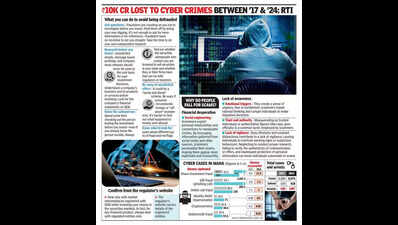- News
- City News
- mumbai News
- Share investment fraud losses in state spiral to 1,000cr+ from 62cr in a year
Trending
Share investment fraud losses in state spiral to 1,000cr+ from 62cr in a year
Mumbai: People fall victim to financial scams primarily due to inadequate research, over-dependence on social media data, lack of proper verification from authoritative sources, and the desire for rapid financial gains, say experts. These schemes—encompassing stock market frauds, cryptocurrency scams, employment-related deceit and parcel gift frauds— frequently lead to complete loss of savings and even life savings. A reply from the Maharashtra cyber cell to queries under the Right to Information Act by Kalyan resident Yamini N shows share investment fraud losses in the state multiplied from Rs 62.2 crore in 2023 to Rs 1,047.3 crore in 2024. Gift fraud (phishing call) losses increased from Rs 63.1 crore in 2023 to Rs 285.3 crore while job fraud losses grew from Rs 88.5 crore in 2023 to Rs 129 crore in 2024.
A 19-year-old management student from Vile Parle East lost Rs 6.1 lakh after responding to a mobile link promoting exceptional share trading returns of 150-300%. He joined WhatsApp and Telegram groups where the admins presented charts and reports showing significant profits and permitted limited withdrawal of earnings to build trust. After he invested Rs 6.1 lakh, all communication ceased and the operators vanished. This approach is commonly utilised in online trading frauds.
The RTI data shows Maharashtra registered 41,568 cyber-related cases between 2017 and 2024. Authorities resolved 6,385 cases and arrested 8,374 individuals. The data further stated online cyber fraud victims have lost a total of Rs 10,051.5 crore between 2017 and2024 in the state and the police across the state have managed to recover Rs 101.9 during the period. Credit and debit card fraud losses increased from Rs 10.2 crore in 2017 to Rs 57.8 crore in 2024, with a sharp rise in share investment, cryptocurrency, and work-from-home scams.
Police and cyber experts said greed, looking for quick income, half-baked market knowledge, and no update on the cyber world are the main causes for people falling prey to scams. "The majority, or 60% of the victims, are senior citizens who have lost their life savings," said a Mumbai cyber police officer.
A senior IPS officer said scammers even pose as human resource (HR) representatives from well-known companies. They entice victims by asking them to like and follow social media accounts and videos, and send them money to gain trust, said the officer.
In another case, A 28-year-old VFX actor from Malad fell prey to a gift parcel scam, losing Rs 5.1 lakh in Sept 2024. She accepted a social media connection from a man who called himself Amanpreet Singh and claimed to be a UK citizen. He established a romantic connection with her, and then told her about a Rs 90 lakh "gift parcel" which required Rs 9 lakh as "tax" payment. "I went blank and transferred the money," she told TOI.
Former police commissioner D Sivanandhan said, "This is bound to rise as technology improves and money-making opportunities increase."
DIG (state cyber) Sanjay Shintre said scammers escalate their operations by adding victims to Telegram groups with sophisticated-looking crypto-trading platforms. "To further deceive victims, scammers create fake virtual wallets to give the impression that their money is safe," he said.
DCP Datta Nalawade (Mumbai cyber) said, "To safeguard your hard-earned money, always invest with proper market knowledge or seek guidance from registered stock brokers, mutual fund distributors, or portfolio management service (PMS) companies." Cyber lawyer Prashant Mali said, "Low conviction rates, about 2.9-7.9% in recent years, suggest lack of deterrence."
End of Article
FOLLOW US ON SOCIAL MEDIA










